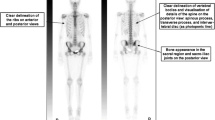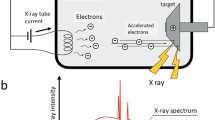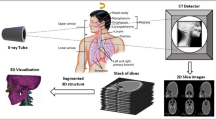Abstract
Purpose
The purpose of this study was to demonstrate the feasibility of accurate quantification in pinhole SPECT using micro-CT information.
Methods
Pinhole SPECT scans were performed using a clinical dual-head gamma camera. Each pinhole SPECT scan was followed by a micro-CT acquisition. Functional and anatomical images were coregistered using six point sources visible with both modalities. Pinhole SPECT images were reconstructed iteratively. Attenuation correction was based on micro-CT information. Scatter correction was based on dual and triple-energy window methods. Phantom and animal experiments were performed. A phantom containing nine vials was filled with different concentrations of 99mTc. Three vials were also filled with CT contrast agent to increase attenuation. Activity concentrations measured on the pinhole SPECT images were compared with activity concentrations measured by the dose calibrator. In addition, 11 mice were injected with 99mTc-labelled Nanobodies. After acquiring functional and anatomical images, the animals were killed and the liver activity was measured using a gamma-counter. Activity concentrations measured on the reconstructed images were compared with activity concentrations measured with the gamma counter.
Results
The phantom experiments demonstrated an average error of −27.3 ± 15.9% between the activity concentrations measured on the uncorrected pinhole SPECT images and in the dose calibrator. This error decreased significantly to −0.1 ± 7.3% when corrections were applied for nonuniform attenuation and scatter. The animal experiment revealed an average error of −18.4 ± 11.9% between the activity concentrations measured on the uncorrected pinhole SPECT images and measured with the gamma counter. This error decreased to −7.9 ± 10.4% when attenuation and scatter correction was applied.
Conclusion
Attenuation correction obtained from micro-CT data in combination with scatter correction allows accurate quantification in pinhole SPECT.







Similar content being viewed by others
References
Zaidi H, Hasegawa B. Determination of the attenuation map in emission tomography. J Nucl Med 2003;44(2):291–315.
King M, Farncombe T. An overview of attenuation and scatter correction of planar and SPECT data for dosimetry studies. Cancer Biother Radiopharm 2003;18(2):181–90.
Corbett JR, Ficaro EP. Clinical review of attenuation-corrected cardiac SPECT. J Nucl Cardiol 1999;6(1 Pt 1):54–68.
Singh B, Bateman TM, Case JA, Heller G. Attenuation artifact, attenuation correction, and the future of myocardial perfusion SPECT. J Nucl Cardiol 2007;14(2):153–64.
Matsumura A, Mizokawa S, Tanaka M, Wada Y, Nozaki S, Nakamura F, et al. Assessment of microPET performance in analyzing the rat brain under different types of anesthesia: comparison between quantitative data obtained with microPET and ex vivo autoradiography. Neuroimage 2003;20(4):2040–50.
Schiffer WK, Mirrione MM, Dewey SL. Optimizing experimental protocols for quantitative behavioral imaging with 18F-FDG in rodents. J Nucl Med 2007;48(2):277–87.
Toyama H, Ichise M, Liow JS, Modell KJ, Vines DC, Esaki T, et al. Absolute quantification of regional cerebral glucose utilization in mice by 18F-FDG small animal PET scanning and 2-14C-DG autoradiography. J Nucl Med 2004;45(8):1398–405.
Chantler CT, Olsen K, Dragoset RA, Chang J, Kishore AR, Kotochigova SA, et al. X-ray form factor, attenuation, and scattering tables (version 2.1). Physics Laboratory, Physical Reference Data. Gaithersburg, MD: National Institute of Standards and Technology; 2005. http://physics.nist.gov/ffast.
Hwang AB, Franc BL, Gullberg GT, Hasegawa BH. Assessment of the sources of error affecting the quantitative accuracy of SPECT imaging in small animals. Phys Med Biol 2008;53(9):2233–52.
Hwang AB, Hasegawa BH. Attenuation correction for small animal SPECT imaging using x-ray CT data. Med Phys 2005;32(9):2799–804.
Meikle SR, Kench P, Kassiou M, Banati RB. Small animal SPECT and its place in the matrix of molecular imaging technologies. Phys Med Biol 2005;50(22):R45–61.
Vanhove C, Defrise M, Lahoutte T, Bossuyt A. Three-pinhole collimator to improve axial spatial resolution and sensitivity in pinhole SPECT. Eur J Nucl Med Mol Imaging 2008;35(2):407–15.
Chow PL, Stout DB, Komisopoulou E, Chatziioannou AF. A method of image registration for small animal, multi-modality imaging. Phys Med Biol 2006;51(2):379–90.
Loening AM, Gambhir SS. AMIDE: a free software tool for multimodality medical image analysis. Mol Imaging 2003;2(3):131–7.
Brown S, Bailey DL, Willowson K, Baldock C. Investigation of the relationship between linear attenuation coefficients and CT Hounsfield units using radionuclides for SPECT. Appl Radiat Isot 2008;66(9):1206–12.
Vanhove C, Defrise M, Franken PR, Everaert H, Deconinck F, Bossuyt A. Interest of the ordered subsets expectation maximization (OS-EM) algorithm in pinhole single-photon emission tomography reconstruction: a phantom study. Eur J Nucl Med 2000;27(2):140–6.
Beque D, Nuyts J, Bormans G, Suetens P, Dupont P. Characterization of pinhole SPECT acquisition geometry. IEEE Trans Med Imaging 2003;22(5):599–612.
Beque D, Nuyts J, Suetens P, Bormans G. Optimization of geometrical calibration in pinhole SPECT. IEEE Trans Med Imaging 2005;24(2):180–90.
Defrise M, Vanhove C, Nuyts J. Perturbative refinement of the geometric calibration in pinhole SPECT. IEEE Trans Med Imaging 2008;27(2):204–14.
Vanhove C, Andreyev A, Defrise M, Nuyts J, Bossuyt A. Resolution recovery in pinhole SPECT based on multi-ray projections: a phantom study. Eur J Nucl Med Mol Imaging 2007;34(2):170–80.
Gullberg GT, Huesman RH, Malko JA, Pelc NJ, Budinger TF. An attenuated projector-backprojector for iterative SPECT reconstruction. Phys Med Biol 1985;30(8):799–816.
Ogawa K, Harata Y, Ichihara T, Kubo A, Hashimoto S. A practical method for position-dependent Compton-scatter correction in single photon emission CT. IEEE Trans Med Imaging 1991;10(3):408–12.
Ogawa K, Chuga A, Ichihara T, Kuba A, Hashimoto S. Quantitative image reconstruction using position-dependent scatter correction in single photon emission CT. Conference record. 1992 Nuclear Science Symposium and Medical Imaging Conference, Orlando, 1993. p. 1011–1013.
Gainkam LO, Huang L, Caveliers V, Keyaerts M, Hernot S, Vaneycken I, et al. Comparison of the biodistribution and tumor targeting of two 99mTc-labeled anti-EGFR nanobodies in mice, using pinhole SPECT/micro-CT. J Nucl Med 2008;49(5):788–95.
Huang L, Gainkam LO, Caveliers V, Vanhove C, Keyaerts M, De Baetselier P, et al. SPECT imaging with 99 mTc-labeled EGFR-specific nanobody for in vivo monitoring of EGFR expression. Mol Imaging Biol 2008;10(3):167–75.
Beekman FJ, van der Have F, Vastenhouw B, van der Linden AJ, van Rijk PP, Burbach JP, et al. U-SPECT-I: a novel system for submillimeter-resolution tomography with radiolabeled molecules in mice. J Nucl Med 2005;46(7):1194–200.
Vastenhouw B, van der Have F, van der Linden AJ, von Oerthel L, Booij J, Burbach JP, et al. Movies of dopamine transporter occupancy with ultra-high resolution focusing pinhole SPECT. Mol Psychiatry 2007;12:984–87.
Li J, Jaszczak RJ, Coleman RE. Quantitative small field-of-view pinhole SPECT imaging – initial evaluation. IEEE Trans Nucl Sci 1995;42(4):1109–13.
Li J, Jaszczak RJ, Greer KL, Gilland DR, DeLong DM, Coleman RE. Evaluation of SPECT quantification of radiopharmaceutical distribution in canine myocardium. J Nucl Med 1995;36(2):278–86.
Vanhove C, Lahoutte T, Defrise M, Bossuyt A, Franken PR. Reproducibility of left ventricular volume and ejection fraction measurements in rat using pinhole gated SPECT. Eur J Nucl Med Mol Imaging 2005;32(2):211–20.
Beekman F, Hutton BF. Multi-modality imaging on track. Eur J Nucl Med Mol Imaging 2007;34(9):1410–14.
Buvat I, Rodriguez-Villafuerte M, Todd-Pokropek A, Benali H, Di Paola R. Comparative assessment of nine scatter correction methods based on spectral analysis using Monte Carlo simulations. J Nucl Med 1995;36(8):1476–88.
Ljungberg M, King MA, Hademenos GJ, Strand SE. Comparison of four scatter correction methods using Monte Carlo simulated source distributions. J Nucl Med 1994;35(1):143–51.
King MA, Hademenos GJ, Glick SJ. A dual-photopeak window method for scatter correction. J Nucl Med 1992;33(4):605–12.
Acknowledgments
Tony Lahoutte is a Senior Clinical Investigator of the Research Foundation – Flanders (Belgium) (FWO). This work was supported by the Inter-University Attraction Poles Programme 6-38 of the Belgian Science Policy and by grant G.0569.08 from the Fonds Wetenschappelijk Onderzoek Vlaanderen.
Author information
Authors and Affiliations
Corresponding author
Rights and permissions
About this article
Cite this article
Vanhove, C., Defrise, M., Bossuyt, A. et al. Improved quantification in single-pinhole and multiple-pinhole SPECT using micro-CT information. Eur J Nucl Med Mol Imaging 36, 1049–1063 (2009). https://doi.org/10.1007/s00259-009-1062-8
Received:
Accepted:
Published:
Issue Date:
DOI: https://doi.org/10.1007/s00259-009-1062-8




